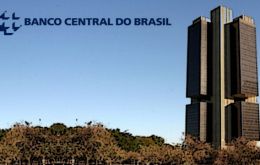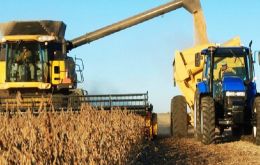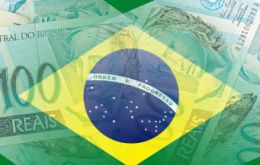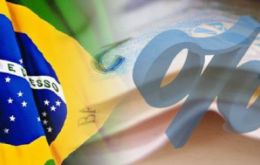MercoPress. South Atlantic News Agency
Tag: Brazilian Institute of Geography and Statistics (IBGE)
-
Wednesday, November 16th 2016 - 09:16 UTC
Brazil's annual inflation below 8%; October's 0.26% increase was the lowest since 2000

Brazil's annual inflation rate in October fell below 8% for the first time since February 2015, keeping the door open for small interest rate cuts as a deep recession lingers. Prices rose 7.87% in the 12 months through October, down from an annual increase of 8.48% in the previous month, statistics bureau IBGE said.
-
Wednesday, October 5th 2016 - 12:02 UTC
Brazil industrial production suffers major monthly drop during August

Brazil’s industrial output posted its biggest monthly drop in over four years in August, damping optimism about the country’s prospects for recovering from its worst recession in generations. Industrial production declined 3.8% in August from July in seasonally adjusted terms, the Brazilian Institute of Geography and Statistics, IBGE, said on Tuesday.
-
Thursday, June 2nd 2016 - 07:31 UTC
Brazil's economy plunges 5.4% in the first quarter compared to a year ago

Brazil's economy sank further into recession in the first quarter, contracting 5.4% relative to the same three-month period of last year, the government said Wednesday. Compared with the final quarter of 2015, the economy shrank by 0.3%, according to the state-run Brazilian Institute for Geography and Statistics, or IBGE.
-
Friday, March 4th 2016 - 07:17 UTC
Brazilian GDP contracted 3.8% in 2015, the worst among major economies

Brazil's GDP fared worse than almost any other major economy in 2015, contracting by 3.8%, according to the national statistics agency IBGE. Economic growth in the world's seventh-largest economy has fallen sharply in recent months, which was due partly to low commodity prices and sluggish global growth.
-
Wednesday, February 3rd 2016 - 06:55 UTC
Brazil factories and mine production plunges 8.3% in 2015, with little prospects of change in the short term

Industrial output in Brazil fell for a seventh straight month in December, capping the worst year for manufacturers in more than a decade as they struggle with inflation, high interest rates and political uncertainty.
-
Monday, December 14th 2015 - 08:17 UTC
Brazil's harvest for 2016 estimated at 209.3 million tons, slight drop from 2015

Brazil's harvest in 2016 will reach 209.3 million tons, which is 0.5% less than in 2015 according to the estimates from the Brazilian stats institute, IBGE. The fall is related to less crops of oilseeds, cereals and legumes in the centre west of the vast country, which is also the main farming area, as well as in the north.
-
Wednesday, December 2nd 2015 - 10:45 UTC
Brazilian economy contracts a record 4.5% in the last twelve months

Brazil's economy, in recession since mid-year, contracted 1.7% in the third quarter, compared to the April-June period, and decreased 4.5% relative to the same period in 2014, the Brazilian Institute of Geography and Statistics, or IBGE, said on Tuesday.
-
Friday, November 20th 2015 - 09:44 UTC
Brazilian economic activity contracts for the fourth straight quarter

Economic activity in Brazil contracted for the fourth straight quarter, central bank data showed this week as Latin America's biggest economy plunges further into recession. The bank's IBC-Br economic activity index indicates economic activity fell 1.41% in the third quarter from the previous three months.
-
Monday, November 9th 2015 - 08:54 UTC
Brazil's annual inflation just below 10%, the highest in 12 years

Brazil's annual inflation rate accelerated in October to just below 10%, the highest reading in almost 12 years, after sharp fuel and food price hikes. Consumer prices, as measured by the benchmark IPCA index, rose 9.93% in 12 months through October, up from 9.49% in September, statistics agency IBGE said in a release. In the first ten months of the year inflation reached 8.52%
-
Wednesday, November 4th 2015 - 23:02 UTC
Brazil's industrial output falls for a fourth straight month in September; 10.9% in twelve months

Brazil's industrial output fell for a fourth straight month in September as automakers, metal producers and other manufacturers were hit by a worsening recession, government data showed on Wednesday. This follows the Brazilian central bank's announcement on Tuesday that the economy in 2015 would shrink over 3% with inflation almost at 10%.
